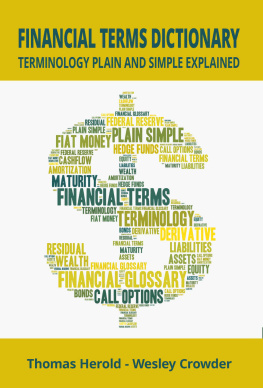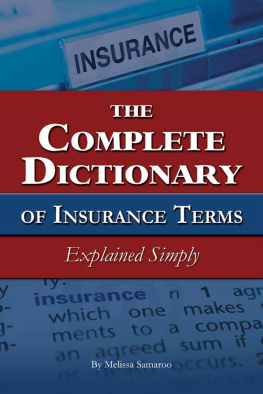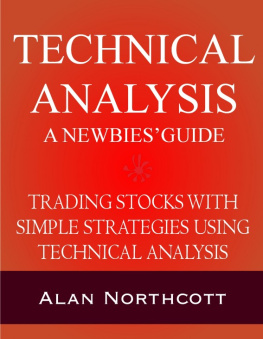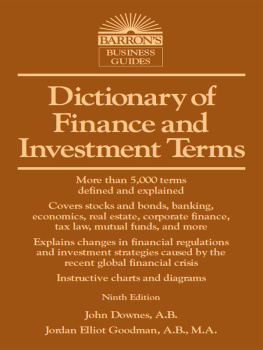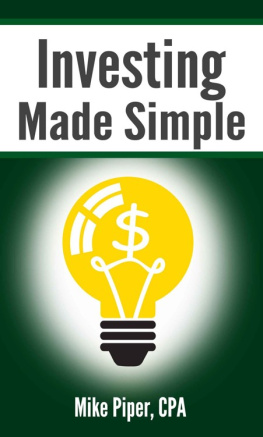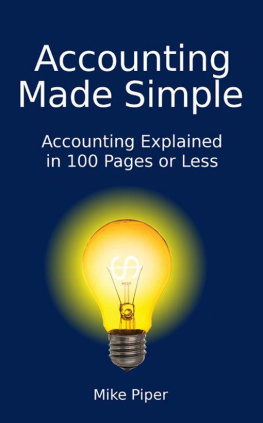Herold Thomas - Financial Terms Dictionary: Terminology Plain and Simple Explained
Here you can read online Herold Thomas - Financial Terms Dictionary: Terminology Plain and Simple Explained full text of the book (entire story) in english for free. Download pdf and epub, get meaning, cover and reviews about this ebook. year: 2014, publisher: Thomas Herold, genre: Business. Description of the work, (preface) as well as reviews are available. Best literature library LitArk.com created for fans of good reading and offers a wide selection of genres:
Romance novel
Science fiction
Adventure
Detective
Science
History
Home and family
Prose
Art
Politics
Computer
Non-fiction
Religion
Business
Children
Humor
Choose a favorite category and find really read worthwhile books. Enjoy immersion in the world of imagination, feel the emotions of the characters or learn something new for yourself, make an fascinating discovery.
- Book:Financial Terms Dictionary: Terminology Plain and Simple Explained
- Author:
- Publisher:Thomas Herold
- Genre:
- Year:2014
- Rating:5 / 5
- Favourites:Add to favourites
- Your mark:
- 100
- 1
- 2
- 3
- 4
- 5
Financial Terms Dictionary: Terminology Plain and Simple Explained: summary, description and annotation
We offer to read an annotation, description, summary or preface (depends on what the author of the book "Financial Terms Dictionary: Terminology Plain and Simple Explained" wrote himself). If you haven't found the necessary information about the book — write in the comments, we will try to find it.
Herold Thomas: author's other books
Who wrote Financial Terms Dictionary: Terminology Plain and Simple Explained? Find out the surname, the name of the author of the book and a list of all author's works by series.
Financial Terms Dictionary: Terminology Plain and Simple Explained — read online for free the complete book (whole text) full work
Below is the text of the book, divided by pages. System saving the place of the last page read, allows you to conveniently read the book "Financial Terms Dictionary: Terminology Plain and Simple Explained" online for free, without having to search again every time where you left off. Put a bookmark, and you can go to the page where you finished reading at any time.
Font size:
Interval:
Bookmark:

Thomas Herold
Evolving Wealth, LLC.
2014 All rights reserved.
Self Publishing
769 Center Boulevard 115Fairfax, CA 94930
USA
ALL RIGHTS RESERVED. This book contains material protected under International and Federal Copyright Laws and Treaties. Any unauthorized reprint or use of this material is prohibited. No part of this book may be reproduced or transmitted in any form or by any means, electronic or mechanical, including photocopying, recording, or by any information storage and retrieval system without express written permission from the author / publisher.
LEGAL DISCLAIMER: This book is presented solely for educational and entertainment purposes. The author and publisher are not offering it as legal, accounting, or other professional services advice.
While best efforts have been used in preparing this book, the author and publisher make no representations or warranties of any kind and assume no liabilities of any kind with respect to the accuracy or completeness of the contents and specifically disclaim any implied warranties of merchantability or fitness of use for a particular purpose.
Neither the author nor the publisher shall be held liable or responsible to any person or entity with respect to any loss or incidental or consequential damages caused, or alleged to have been caused, directly or indirectly, by the information or programs contained herein.
No warranty may be created or extended by sales representatives or written sales materials. Every company is different and the advice and strategies contained herein may not be suitable for your situation.
You should seek the services of a competent and professional financial advisor before beginning any investments.401Ks are retirement plan accounts. Contrary to what you may have heard, these accounts are not actually investments. They are specific purpose accounts that are funded using pre-taxed dollars taken out of your payroll. Wealth can be built up for retirement by purchasing assets in the plan that includes stocks, mutual funds, index funds, bond, and real estate investment trusts. These accounts do not get taxed on dividends, capital gains, or interest earned within them until such gains are later withdrawn.
A number of different kinds of 401K plans exist. All of them have their own specific purposes, drawbacks, and benefits. For example, those who work for not for profits or government agencies are not eligible for standard 401K accounts. They are offered 403B plans instead.
The Roth 401K is another type of 401K plan. It allows workers to put taxed dollars into their account. While they do not permit contribution tax write offs now, they do ensure that income taxes will never have to be paid on any of the account money, including dividends and capital gains earned, when it is withdrawn for retirement.
Another type of 401K plan is the Self Employed 401K. This new type of 401K account is ideal for people who work for themselves. It includes a number of different features that make it very appealing to the owners of small businesses.
Five main benefits comprise the advantages of 401K retirement plan investing. These include tax advantages, employer based match programs, portability, investment versatility, and hardship and loan withdrawal capabilities. The tax advantages of traditional 401Ks center around the fact that your contributions are fully tax deductible, meaning that you only pay income taxes on the money as it is taken out.
Employer based match programs are like receiving free money for retirement. A number of employers offer this benefit of matching a certain percentage of a contribution of an employee as a benefit, for obtaining and keeping quality employees. These amounts can range up to a hundred and fifty percent of amounts contributed and even higher.
Portability of 401Ks allows for you to take your account with you after leaving an employer. This is fitting since the account belongs to you and not the employer. You also have the option to leave an account with an employers plan, if you prefer.
The investment versatility of 401Ks means that many choices of investments are available for the funds placed in these accounts. Lower risk investors can choose to hold short term bonds. Higher risk investors might opt for equities and higher risk investments.
401Ks also feature the ability to take loans against them. These are repaid according to terms set up with the plan administrators. When a family has medical expenses or other disasters to deal with, they may also take a hardship withdrawal from the plan. Pre-retirement age withdrawals include a ten percent plus tax rate penalty.
The maximum amounts that may be contributed every year in a 401K account vary with your salary, plan type, and government regulations. Typically, it is the lesser of either the most that your employer will allow you to put in as a percentage of your salary, such as four percent, or $16,500 plus the inflation index, as per 2010 government rules. This maximum dollar amount is increased with changes to the cost of living index each year.
Accountants are professional financial personnel whose careers are centered on dealing with money and figures. Their responsibilities cover compiling financial records, certifying them, and recording them for businesses, individuals, government organizations, and not for profit organizations. As such, they track a company or individuals money through the development of reports.
Managers of companies and organizations and other individuals read these accounting reports. The managers learn the state and progress of their company from them. Governments utilize these reports to determine the taxes that companies are required to pay. Investors and other businesses look at them to determine if they wish to work with a company. Banks and others investigate these reports in their decisions of lending money to a company.
The majority of accountants are specialized. Four main types of accountants practice their trade. Management accountants follow the money that is both earned and spent by their employing companies.
Public accountants work at public accounting firms. Here, they perform auditing, accounting, consulting, and tax preparation work. These types of accountants perform numerous tasks for individuals who are clients of the accounting firm. Some public accountants have their own small business.
Government auditors and accountants ensure that the accounting records of government agencies are correct. Besides this, they double check the record of those individuals who transact business with the government. This helps to keep governments responsible.
Internal auditors are accountants who ensure that the accounting records of their company are correct. In this role, they are investigating to make certain that no person within the firm is stealing. Besides this, they investigate to make certain that no individual in the company is wasting the firms capital.
Accountants perform their tasks in offices. Those accountants who work for public companies and government groups often travel to perform audits of their own companys other branches or outside companies. Regarding their hours, accountants typically work for a normal forty hours per week. Some accountants ply their trade for more than fifty hours each week. Especially in tax season that runs from January through April, tax accountants commonly work incredibly long hours.
Font size:
Interval:
Bookmark:
Similar books «Financial Terms Dictionary: Terminology Plain and Simple Explained»
Look at similar books to Financial Terms Dictionary: Terminology Plain and Simple Explained. We have selected literature similar in name and meaning in the hope of providing readers with more options to find new, interesting, not yet read works.
Discussion, reviews of the book Financial Terms Dictionary: Terminology Plain and Simple Explained and just readers' own opinions. Leave your comments, write what you think about the work, its meaning or the main characters. Specify what exactly you liked and what you didn't like, and why you think so.

